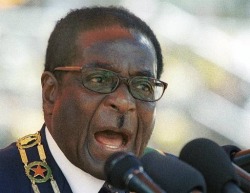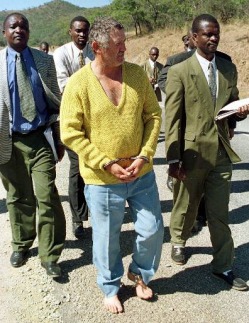Zimbabwe: Current Status
Jenna Wohlfert
World History- Hjelmgren
period 1. 4.8.09
Zimbabwe Current Status
Zimbabwe has come a far distance from what they use to be, a simple country under the control of Britain. Now, they have their own government, their part of the UN, and are making their own decisions.
The government started out great like any government. Zimbabwe has a Parliamentary Democracy with President Robert Mugabe and Prime Minister Morgan Tsvangirai. Mugabe became president after he took over ZANU-PF (Zimbabwe African National Union- Patriotic Front; ruled Zimbabwe from 1980 to 1988 when Mugabe took control). In the past year, President Mugabe has created tensions between other countries and with his own people. He has become drunk with power and extremely paranoid. People would be murdered if they question his abilities and he has even beat Tsvangirai so bad that it sent him to the hospital. “You might think the last year[2006], which has seen 32 murders, countless cases of rape, torture, arson and beating, all to help Mugabe steal an election, would have made it even harder, but the reverse is true.” (R.W. Johnson) The country now realizes that he has become a bad influence on the country and will do them no good, but no one can stand up to him. R.W. Johnson. eZine.
Zimbabwe’s economy has slowly declined due to a combination of government mismanagement, political unrest, international sanctions, rampant hyperinflation (extreme price rising), aids, and famine. There has been a 50% price reduction causing renewed severe shortages of basic foodstuff and other commodities. There has been a record high unemployment rates at more than 70% of the about 4 million workers were unemployed by January 2007. One US dollar equals $37,456,777 in Zimbabwe. 1998-2002 Zimbabwe was involved in the war in the Democratic Republic of Congo that also drained millions of dollars. Mugabe has confiscated lands belonging to white farmers causing grain food to plummet extremely. CNN.
Zimbabwe joined the UN on August 25th, 1980 and contributed to peacekeeping troops to the UN. Zimbabwe is a main supporter of the Kabila Government in the Democratic Republic of Congo. On May 12, 2007 Zimbabwe was elected to be head of the UN’s commission on Sustainable Development (CSD). Though Zimbabwe was questioned because Western diplomats said it was unsuitable because of its human rights record and economic problems. It is suffering food shortages and rampant inflation.
Zimbabwe has tensions with the US and other countries, not because of terrorism, but because of human rights and Mugabe’s “outpost of tyranny” Zimbabwe has become helplessly under Mugabe’s rule and Mugabe’s only allies are ZANU-PF who bullies everyone to get what he wants. The US has given Zimbabwe $900 million from 2002-2008 all in humanitarian aid to the people who have been forced out of their homes, gotten diseases and aids, and are in desperate need for food and water. He won the election that way, and he is already 84 years old. Mugabe only has two remaining supporters, South Africa and China, and now the UN is trying to convince them to drop Mugabe. If they do, then members of his own party will force him to step down. He has been ruling since the independence of Zimbabwe and he has gained many enemies, but does not pose a threat to any other countries, so no one will take action. He is now saying that he would rather go to war than hand over power to the MDC- Movement for Democratic Change. Keith Porter. U.S. Department of State.
Zimbabwe has many religions like Christianity and Islam to the indigenous religions like Shona and Ndebele. Shona and Ndebele believe that there is a higher being that is active in everyday life (Mwari-Shona; uMlimu- Ndebele) But the Shona believe in vadzimo- guardian ancestors that keep them safe from ngozi- evil spirits- and witches. Majority of the Zimbabwe population is Christian brought over by the British. There is also Syncretism, which is a mixture between Christianity and the indigenous religions. Post Imperial.
Johnson, R.W. "How Mugabe came to power." London Review of Books. 4 May
2009 <http://www.lrb.co.uk/v23/n04/john01_.html>.
(What has happened in the last year because of Zimbabwe)
"Robert Mugabe: Zimbabwe's Dictator for Life?" eZine. 4 May 2009
<http://www.lilith-ezine.com/articles/politics/Zimbabwe-Robert-Mugabe.html>.
(Issues on Robert Mugabe)
"The Literature and Culture of Zimbabwe." Post Imperial. 4 May 2009
<http://www.postcolonialweb.org/zimbabwe/religion/zreligionov.html>.
(Religion and Culture of Zimbabwe)
Porter, Keith. "The US-Zimbabwean Relationship." About. 6 May 2009
<http://usforeignpolicy.about.com/od/countryprofiles/p/uszimbabwe.htm>.
(Zimbabwe relationships with the US)
"'Dire' economy shaking Zimbabwe." CNN. 6 May 2009
<http://www.cnn.com/2009/WORLD/africa/02/22/zimbabwe.prime.minister/index.html>.
(Zimbabwe’s current economy situation.)
"Zimbabwe." U.S. Department of State. 6 May 2009 <http://www.state.gov/r/pa/
ei/bgn/5479.htm>.
(Zimbabwe Background note- Geography, People, Government, Economy, People and History, Early History, British Settlement and Administration, Unilateral Declaration of Independence (UDI), Post-UDI, Zimbabwe Since Independence, Foreign Relations, Economy,


